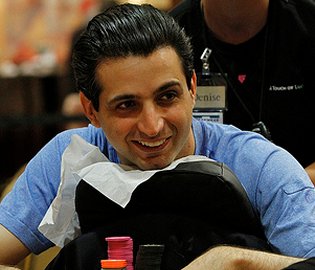
The recently completed stop on the World Poker Tour, the Legends of Poker at the Bicycle Casino in Los Angeles, CA, brought a great deal of excitement for poker fans. With several notable names at the final table, including Jeff Madsen, Greg Mueller and Ali Eslami, Josh Hale was able to outlast the field to take the title. But it is the actions of Eslami earlier in the tournament that have ignited discussion across the poker landscape.
Allen Kessler – known for his rigid observance of poker’s rules – seems to have started the firestorm with a posting not only on the Two Plus Two forum but also his own Facebook page yesterday. In his Facebook posting, Kessler noted that on Day 1A, “The WPT Main Event at the Bike (condoned) Ali Eslami, Ray Henson and others at one table, who had agreed to blind raise UTG (under the gun, or first after the big blind) and UTG plus one in early levels. This creates huge stacks at one table and those players…thrive from this (to go deep in the tournament).”
“It’s easy to see how condoning this sort of agreement can dramatically affect the outcome of a WPT Main Event,” Kessler closed his posting by writing.
It took little time for the players involved to chime in with their responses to Kessler’s comments. In a lengthy Facebook post, Henson claims, “Kessler’s story is way off, here’s what actually happened.”
“Ali got moved to my table and, on his first hand, he was UTG. As Ali always does, he wanted to make his presence felt so he “blind raised” to 300 (blinds were 150/300 with a 25 ante),” Henson begins. “The table was very tough for this event, had like six pros and three amateurs. Next orbit, Ali is UTG and decides he will “blind raise” again. This goes on for a few orbits until another player decided he would do it, then another did and another…pretty soon, the entire table was doing it almost every time.”
“There was no ‘agreement’,” Henson firmly states. “If someone didn’t want to do it, then they didn’t do it.” In response to Kessler’s veiled accusation at a tournament stop in Oklahoma this week that this type of play helped Eslami make the final table of the Legends of Poker, Henson says, “This is a joke, he went deep because he ran like God on Day Two.”
Eslami also pipes into the discussion with his own lengthy dissertation, writing, “Yeah, when I first got broken to the table I was in the UTG position, so I immediately threw out a blind raise before I even sat down. I was just doing it to amuse myself…I just PLAY with the game, because ultimately it IS a game.”
Eslami explains how he thought it would die down after he did it the second time, but then says that the table gradually picked up the maneuver and the other players began to do it. It lasted, according to Eslami, for a few turns until other tables began to “get fussy” and “take the fun factor out of the whole thing.” “I finished the day with approximately the starting stack (Eslami was on 33K at the end of Day 1A) and that was that,” Eslami writes.
Kessler questioned WPT Tournament Director Matt Savage about the controversy, but Savage’s hands were essentially tied. Although he did Tweet to Kessler that “Agreements as to how to play (blind raise or reraise) are never allowed,” according to the WPT guidelines, “The WPT is not responsible for any tournament event details including, without limitation, structures, schedules, formats, general rules (where the Eslami case lands) or prize pool distributions.” Thus, Savage could do nothing on the subject as it was up to The Bike’s tournament staff to make a determination on whether the table’s conduct was breaking any rules.
The Tournament Directors Association has a 54-rule guideline for poker in general, but there isn’t anything explicitly spelled out in those rules that would prevent Eslami’s action. The closest that the TDA rulebook comes to the subject is in discussing collusion and ethical play.
Since making his posting yesterday (and the responses from Henson and Eslami), Kessler has seen 143 comments on his Facebook page regarding the issue and the 2+2 thread has received over 200 responses. Interestingly enough, most of the comments on Kessler’s Facebook post are running against his stance, while the 2+2 thread seems evenly split.
The question isn’t about whether Eslami used this tactic to scoop up chips to finish strong at the Legends of Poker (as he admitted, he held roughly the same stack he started Day 1A with and went on to finish fourth); Eslami’s talents on the table are also unquestioned. But something for other tournament directors to look at may be whether such an issue as the one at the Legends of Poker could have an effect on the event; if so, then TDs have to take action on the issue.























